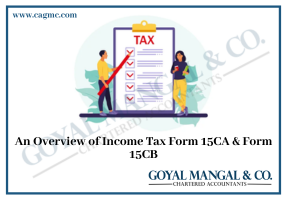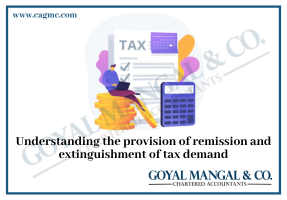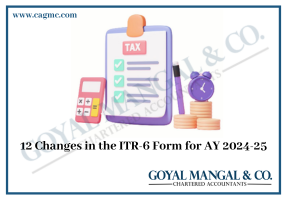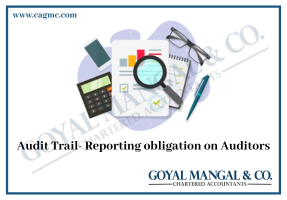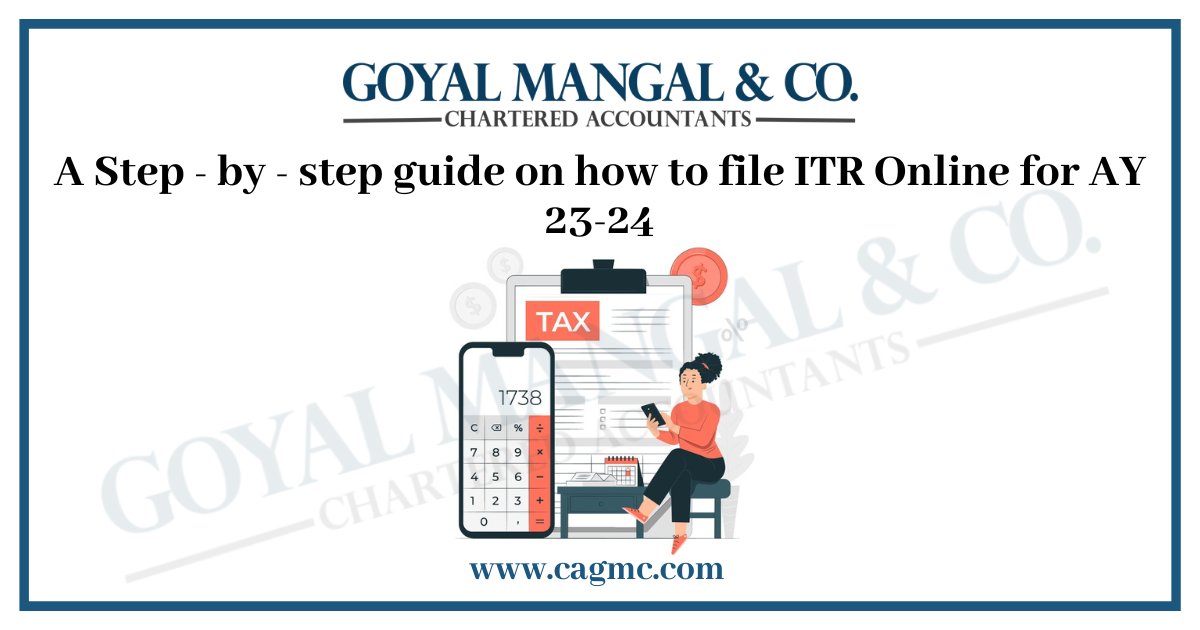
Tax season can often feel like an intricate maze, where rules and regulations twist and turn, even leaving taxpayers perplexed. But no need to fear as we are here to unravel the mystery and guide you through the labyrinth of online (ITR) Income Tax Return filing for AY 23-24. Thus, say goodbye to piles of paperwork, confusing jargon, and the uncertainty of whether you have done it right. With our comprehensive guide, you will gain a newfound understanding of the process, making sure you navigate the virtual corridors of tax filing like a seasoned pro.
|
Table of Content |
What do you mean by Income Tax Return?
An income Tax Return (ITR) means a document or form that businesses, individuals, or entities are needed to file with the tax authorities, providing details of their income, tax liabilities, and deductions for a specific financial year. The Income Tax Act, 1961, governs the filing of ITR in India.
The ITR form requires taxpayers to disclose various types of income, such as salary, house property, capital gains, business or profession, and other sources. It also provides sections to claim deductions, exemptions, and credits, which help in determining the taxable income and tax liability.
The ITR serves as a declaration of an individual’s taxable income, sources of income, and tax payments made during the financial year. It is a means for taxpayers to communicate their financial information to the tax authorities and fulfil their legal obligation of reporting their income and paying the appropriate taxes.
Importance of Income Tax Return filing
Filing your ITR is of great importance for several reasons:
- Legal Requirement: Filing ITR is a legal obligation imposed by the Income Tax Act, 1961. Individuals and entities meeting the specified criteria are required to file their ITR within the prescribed time frame. Non-compliance with this requirement can result in penalties and legal consequences.
- Income Verification: ITR serves as proof of your declared income and assets. It helps the tax authorities to verify the income and expenditure details provided by taxpayers, ensuring transparency and accountability.
- Claiming Refunds: If you have paid excess tax during the financial year, filing ITR enables you to claim a refund. By providing accurate information about your income, deductions, and tax payments, you can receive a refund of the excess tax paid.
- Carry Forward of Losses: Filing ITR is essential for carrying forward losses incurred in certain heads of income, such as capital gains or business losses. These losses can be adjusted against future profits, reducing your tax liability in subsequent years.
- Loan and Visa Applications: Banks and financial institutions often require ITR documents as proof of income while processing loan applications. Similarly, when applying for a visa, particularly for foreign travel, the ITR serves as evidence of your financial standing and income stability.
- Financial Record: Filing ITR helps create a comprehensive financial record of your income, expenses, and investments. This record can be useful for future financial planning, loan applications, and audits.
- Government Benefits: Some government schemes and benefits, such as subsidies, loans, or scholarships, may require individuals to submit their ITR documents as proof of income eligibility.
Eligibility criteria for filing Income Tax Return for AY 23-24
The eligibility criteria for filing ITR online for AY 2023-2024 may vary depending on the individual’s income, age, and other factors. Here are some general eligibility criteria:
- Resident Individuals: Resident individuals, including salaried employees, self-employed individuals, professionals, and businessmen, are eligible to file ITR online.
- Non-Resident Individuals: Non-resident individuals are also eligible to file ITR online if they have any income sourced in India or if they qualify as Resident and Ordinary Residents (ROR) for the relevant financial year.
- Income Threshold: The specific income threshold for filing ITR online varies based on different categories of individuals. For AY 2023-2024, the basic exemption limit for resident individuals below 60 years of age is Rs. 2.5 lakh. However, this limit may change, so it is advisable to refer to the latest information from the Income Tax Department.
- Mandatory Filing: Even if an individual’s income falls below the basic exemption limit, there are cases where it is mandatory to file ITR. For example, if you have carried forward losses or if you wish to claim a refund of excess TDS deducted, filing ITR becomes necessary.
- Income Sources: Individuals with income from various sources like salary, house property, capital gains, business or profession, or any other income need to file ITR online.
- Foreign Assets: If you own any foreign assets or have signing authority in any foreign account, you are required to file ITR online, irrespective of your income level.
Documents required for filing ITR
To file your ITR online, you will need the following documents and information:
- Permanent Account Number (PAN): Taxpayer should have their PAN Card handy.
- Aadhaar Card: Linking your Aadhaar card to your PAN is essential for ITR filing. Ensure your Aadhaar details are up to date.
- Bank Account Details: You will need your bank account number, account type (savings/current), IFSC code, and bank branch details for online tax refund processing and communication.
- Form 16/16A: If you are a salaried employee, you will need Form 16, which is issued by your employer and provides details of your salary, tax deductions, and TDS (Tax Deducted at Source). Form 16A is applicable for TDS deductions other than salary income.
- Form 26AS: This form provides a summary of all the taxes deducted on your behalf and any advance tax payments made during the financial year. It can be downloaded from the TRACES website or accessed through the income tax e-Filing portal.
- TDS Certificates: If you have received income on which tax has been deducted at source, such as rental income or interest income, you will need the TDS certificates issued by the diductor(s).
- Details of Other Income: If you have any other sources of income apart from your salary, such as rental income, capital gains, or interest income, gather the necessary documentation to support those income sources.
- Investment-related Documents: Gather documents related to your investments, such as proof of investments in tax-saving schemes (e.g., ELSS, PPF, NSC), home loan interest certificates, health insurance premium receipts, and donations made to eligible charitable organizations.
- Previous Year’s ITR: If you have filed your ITR in the previous year, having a copy of that return can be helpful for reference and continuity of information.
- Any other supporting documents: Depending on your specific income sources and deductions, you may require additional documents, such as rent receipts, medical bills, education loan interest certificates, etc.
Step-by-step process on how to file ITR Online for AY-23-24
Filing your ITR online is a convenient and efficient way to fulfil your tax obligations. Here is a step-by-step guide on how to file your ITR online for AY 2023-2024:
- Gather the required documents: Before you begin filing your ITR, ensure you have the above-mentioned documents and information ready.
- Choose the correct ITR form: Identify the appropriate ITR form for your income sources and download it from the official Income Tax Department website. AY 2023-2024 may have different ITR forms depending on the nature of income and eligibility criteria.
- Register on the e-Filing website: If you are a first-time user, you need to register on the Income Tax Department’s e-Filing website. Provide your PAN, basic details, and create a username and password.
- Log in to the e-Filing portal: Once registered, log in to the e-Filing portal using your username, password, and the generated captcha code.
- Fill in the ITR form: On the e-Filing portal, navigate to the “e-File” section and select the “Income Tax Return” option. Choose the assessment year and the appropriate ITR form you downloaded in Step 2. Fill in the required details accurately and completely, including personal information, income details, deductions, etc.
- Validate the data and calculate tax: After filling in the details, validate the data to check for any errors or missing information. Once validated, calculate your tax liability using the in-built calculator provided in the ITR form.
- Pay any outstanding tax: If you have any tax payable, pay it online through the e-Filing portal using the available payment options like net banking, debit card, credit card, etc.
- Review and submit: Carefully review all the information provided in the ITR form. Make sure all details are accurate and complete. If everything is in order, submit the form electronically. You will receive an acknowledgement number upon successful submission.
- Verify your ITR: After submission, you must verify your ITR within a specified time frame. There are several methods available for verification, such as electronic verification code (EVC) through Aadhaar, net banking, or sending a signed physical copy to the Income Tax Department.
- Keep a record of the acknowledgement: Once your ITR is successfully verified, you will receive an acknowledgement from the Income Tax Department. Keep a copy of this acknowledgement for future reference.
Takeaway
Through this article, we can say that filing your ITR online for AY 23-24 doesn’t have to be a daunting task. With the step-by-step guide provided, you now have the knowledge and confidence to navigate the process smoothly. By following the outlined steps, gathering the necessary documents, and ensuring accuracy in your details, you can fulfil your tax obligations efficiently and effectively. It also allows you to claim refunds, carry forward losses, and maintain a comprehensive financial record. By being proactive in your tax compliance, you can avoid penalties and legal consequences while building a strong financial profile.

